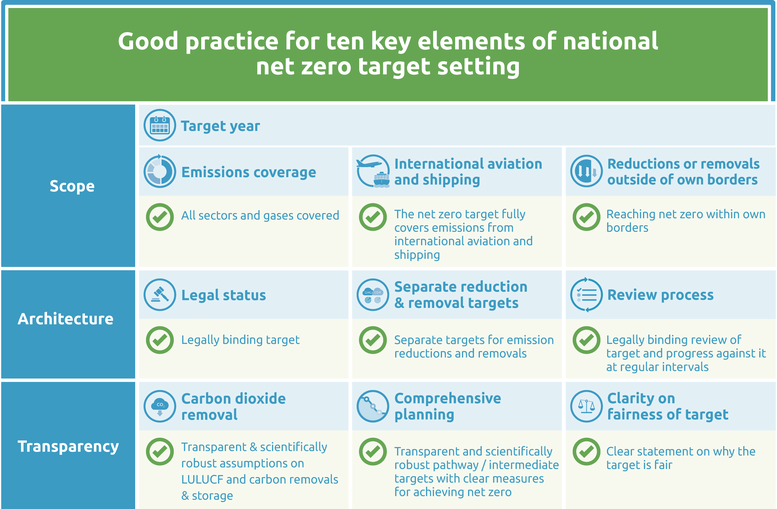Net zero targets
Summary
We evaluate the net zero target as: Average
In November 2021, Nigeria passed the Climate Change Act that seeks to achieve low greenhouse gas emissions, green and sustainable growth by providing the framework to set a target to reach net zero between 2050 and 2070 (Okereke & Onuigbo, 2021). The Act includes provisions to adopt National Climate Change Action Plans in five-year cycles (Federal Republic of Nigeria, 2021). The Action Plans, to be implemented by the National Council on Climate Change (NCCC) established by the Act, are meant to ensure national emissions are consistent with a carbon budget. The carbon budgets are to be set by the federal ministries responsible for the environment and national planning and periodically reviewed.
The government has not met the initial deadlines set in the Act. Under the Act, the pilot Action Plan and first carbon budget should have been published by November 2022; however, as of December 2024 this has not happened and several other milestones were delayed (Adebote, 2022; Ailemen, 2023). President Tinubu also appointed a new Director-General of the NCCC in June 2024, pending confirmation by the NCCC Supervisory Council (Ngelale, 2024).
At COP26, former President Buhari further committed to net zero emissions by 2060, which would be in line with the Climate Change Act (Lo, 2021).
Nigeria’s August 2022 Energy Transition Plan (ETP) was developed to serve as the pathway towards achieving the 2060 net zero target (Federal Republic of Nigeria, 2022). In February 2023, the integration of the Energy Transition Plan and Office into the NCCC was approved to ensure continuity of the plan with the Climate Change Act. Following his confirmation in May 2023, President Bola Tinubu further emphasised that Nigeria was committed to achieving net zero emissions in line with the Climate Change Act (Tinubu, 2023).
Nigeria has also launched a long-term vision to 2050, which informed the development of its Long-Term Low Emission Development Strategy (LT-LEDS) (Akinola, 2021; DCC, 2021). The LT-LEDS was submitted in 2024 and includes a revised vision statement, adapted from the long-term vision to 2050, noting the 2060 commitment applies “across all sectors” (National Climate Change Council, 2023b).
The LT-LEDS also introduces several scenarios, including the Renewable Energy Scenario (RES) which is the only scenario to achieve the 2060 commitment and align with the long-term vision goal of reducing emissions 50% by 2050. However, the Current Policy Scenario, which assumes “an economy guided by the ambition of the ETP (Net-Zero by 2060) and the NDC”, does not achieve net-zero emissions by 2060. The LT-LEDS says this is because the ETP does not cover AFOLU emissions (National Climate Change Council, 2023b).
CAT analysis of net zero target
Ten key elements
Scope
- Target year – Nigeria’s Climate Change Act seeks to achieve low greenhouse gas emission, green and sustainable growth by providing the framework to set a net zero GHG target between 2050 and 2070 (Federal Republic of Nigeria, 2021). Nigeria’s NDC update mentions aiming to reach net zero as early as possible in the second half of the century. At COP26, former President Buhari committed to achieving net zero by 2060, also included in Nigeria’s Energy Transition Plan and Long-Term-Low Emission Development Strategy (LT-LEDS) and reaffirmed by President Tinubu (Federal Republic of Nigeria, 2022; Lo, 2021). We take Nigeria’s target year to be 2060 as indicated in the LT-LEDS.
- Emissions coverage – The target covers all Kyoto gases except NF3 (Art. 35 of the Act). No data is available for the level of NF3 emissions, but other F-gases represent less than half a percent of Nigeria’s emissions. The Act does not specify sectoral emissions coverage, but as the corresponding carbon budget should be set "for Nigeria." The LT-LEDS says Nigeria will achieve net-zero emissions “across all sectors”, thus we assume the target is economy-wide.
- International aviation and shipping – The Act does not include any information on international aviation and shipping. The LT-LEDS mentions international aviation only as an example within the context of voluntary carbon markets, not including any information on how international aviation and shipping are included in the target.
- Reductions or removals outside of own borders – The Act applies to entities within the territorial boundaries of Nigeria and the Environment Ministry is required to set a carbon budget for Nigeria. We interpret these provisions to mean that Nigeria’s target is focused on cutting emissions within its own borders. The government should clarify its intent to achieve net zero emissions domestically.
Target architecture
- Legal status – In November 2021, Nigeria passed the Climate Change Act, which seeks to achieve low greenhouse gas emissions and green and sustainable growth by providing a framework to set a net-zero GHG target between 2050 and 2070 (Federal Republic of Nigeria, 2021). The carbon budget and Action Plan, required within a year of the adoption of the Act, have not yet been released. Following the launch of the Long-Term Vision, in 2024 Nigeria submitted a Long-Term Low Emissions Development Strategy (LT-LEDS), which includes a net zero GHG target of 2060 (National Climate Change Council, 2023b).
- Separate reduction & removal targets – Nigeria has not provided any information on whether it will establish separate emission reduction and removal targets.
- Review process – · Nigeria’s Climate Change Act includes detailed provisions for periodically revising its carbon budget as well as its Action Plan. The federal ministries responsible for environment and for national planning are required to present a carbon budget and determine the budgetary period one year after the act was signed into law, by November 2022. However, as of December 2024, we have not been able to identify a carbon budget.
A new carbon budget must subsequently be produced one year before the end of the current carbon budget cycle. The Secretariat of the National Council on Climate Change must also produce an Action Plan to ensure national emissions are consistent with the carbon budget every five years. The Action Plan must include a carbon budget in line with the five-year cycle and annual carbon budgets for each year in the cycle.
The Secretariat must also regularly report to the National Assembly on the state of implementation of the Plan. The Act also establishes obligations on public and private entities to achieve targets and consequences for failing to do so.
The Act does not, however, specify a process for reviewing the net zero target itself.
Transparency
- Carbon dioxide removal – Nigeria’s Climate Change Act does not provide any information on its intention to communicate transparent assumptions on domestic carbon dioxide removals to meet its net zero target (Federal Republic of Nigeria, 2021).
The Act, however, includes text on the promotion of nature-based solutions, the establishment of a REDD+ Registry and development of natural capital accounts to be used by government bodies in policy and action plan formulation in line with the carbon budget. The RES scenario in the LT-LEDS, the only scenario to reach net zero, assumes reforestation under the National Forestry Policy would achieve a carbon sink of 70 MtCO2 by 2060 (National Climate Change Council, 2023b). - Comprehensive planning – Under the Act, the federal ministries responsible for environment and for national planning are required to set a 1.5°C consistent carbon budget. The Act includes provisions to develop National Climate Change Action Plans every five years to be ratified by the Federal Executive Council that will be overseen by the National Council on Climate Change. The Action Plans aim to ensure national emissions are consistent with the carbon budget and should include annual carbon budgets for each year in the five-year cycle. A pilot Action Plan should have been adopted by November 2022; however, as of December 2024, a plan has not yet been presented (Ailemen, 2023).
Nigeria also released its Energy Transition Plan in August 2022. The plan is expected to serve as Nigeria’s pathway to achieve its 2060 net zero target (Federal Republic of Nigeria, 2022). This pathway is further supported by the LT-LEDS, which includes three emissions scenarios, of which only the Renewable Energy Scenario, achieves net zero emissions by 2060. - Clarity on fairness of target – The Act does not include any information pertaining to the fairness of Nigeria’s target.
Good practice
The Climate Action Tracker has defined the following good practice for all ten key elements of net zero targets. Countries can refer to this good practice to design or enhance their net zero targets.
Further analysis
Country-related publications
Stay informed
Subscribe to our newsletter


